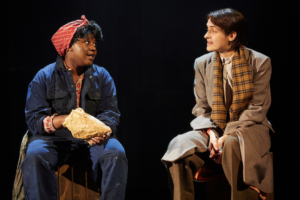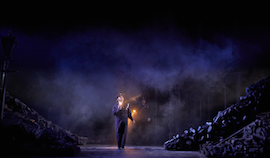Guest Blog: Actress Mara Allen On The UK Tour of THE NIGHT WATCH

in The Night Watch
The Night Watch is my first tour, as well as debut, since graduating from the Royal Academy of Dramatic Art this year. It has been such an exciting experience so far getting to know fellow actors who have worked consistently in the industry, as well as talented creatives such as Alastair Whatley, the director of the show.
Coming out of RADA was both bitter and sweet, since I enjoyed my time there so much, but knowing I'd landed a role in the The Night Watch as soon as I graduated was a fantastic feeling.
Being part of a touring production has definitely kept me on my toes, due to the changing venues and show times, which is great because it's improved my adaptability and stamina as an actor. Especially with a show like The Night Watch, which is a play that constantly has scenes bleeding into each other.
Taking this show on tour has also allowed me to discover new details within the play that I didn't discover during rehearsals about my character's journey and how it may parallel other characters' paths.
Based on the Sarah Waters novel, The Night Watch highlights the emotional journeys of a community of strangers living in post-war London, starting in 1947 and going backwards to 1941. It focuses on four ordinary people caught up in the aftermath of an extraordinary time.
I'd read the novel whilst auditioning for the play and fell in love with it instantly, particularly the character of Mickey, who I'm playing. It's a beautiful story that focuses on women's hidden lives which are uncovered during the war. I couldn't help but shed a tear or two because the novel takes you on such an emotional journey, with little shimmers of love and hope as relationships between characters begin to develop.

Hattie Naylor's adaptation of the play definitely brings the ups and downs that take place in the story to light. Many audiences who haven't come across the book before are surprised to learn that the play covers themes that go beyond the war, such as mental health and sexuality.
In particular, it explores the sexual relationships between women, which were never spoken about then. The tender exploration of relationships during wartime contrasts with the reality of post-war Britain, juxtaposing these relationships with the tragic loss of lives and homes. It is a very human focused story.
I love that each audience has their own opinions on events that happen in the play, as well as on ambiguous characters who either only appear once or have hidden backgrounds. I think it's the perfect time to present this piece to audiences. Many can identify with the effects of heartbreak and abandonment that the characters suffer in the play, and have also struggled to find a way to "get over it", as Mickey would say.
What I particularly love about this play is the LGBTQ+ depiction. When I learnt about the war at school, lesbian or gay couples were never discussed, giving the impression that an LGBTQ+ community never existed.
I'd like to think that The Night Watch has not only educated younger audiences that this community did indeed exist, but has also depicted a story that everyone can relate to. Older audiences have said that the play gives them a sense of nostalgia, and has reminded them of things that were happening in their hometown. A lady once described those people as "forgotten souls", as they suffered these personal issues and dilemmas alone - the war effort was priority. All the responses on our tour so far have been truly moving, and the play's had huge admiration from our audiences, especially in York from Sarah Waters fans.
It has truly been an honour to have this play as my first job, and have such a supportive company to guide me through.
The Night Watch continues on tour - find full dates and venues here
Photo credit: Mark Douet
Watch a trailer below!
Comments

Videos

